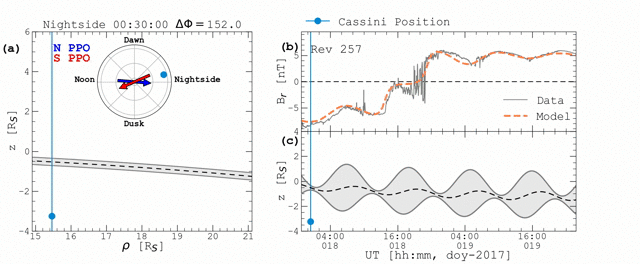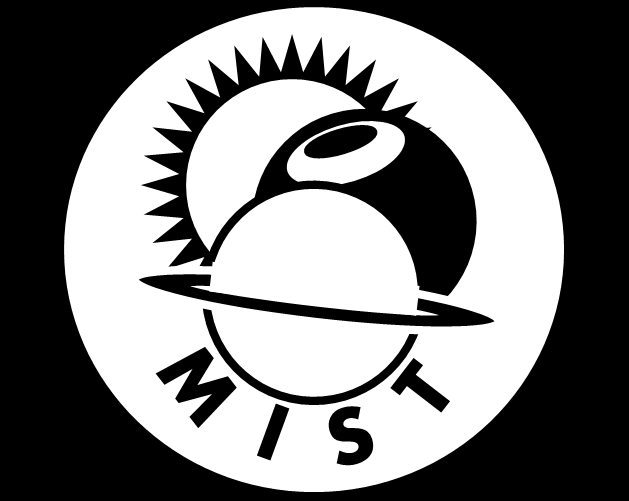MIST
Magnetosphere, Ionosphere and Solar-Terrestrial
Modelling the temporal variability in Saturn's magnetotail current sheet from the Cassini F‐ring orbits
By Omakshi Agiwal (Imperial College London)
The Cassini spacecraft completed 20 high latitude orbits known as the ‘F-ring orbits’ during the end of mission (corresponding to northern Saturnian summer). Each orbit provided a ~2 day sample of the magnetotail region, where the measured radial magnetic field Br and the position of the magnetic equator/magnetotail current sheet centre (indicated by Br=0) showed significant orbit-to-orbit variability, despite a highly repeatable spacecraft trajectory.
Our work considers two well-known sources of temporal variability in the Saturnian magnetosphere:
- Solar wind forcing, which acts to displace the magnetic equator from the rotational equator. The forcing increases with radial distance from the planet and is variable with solar wind conditions on ~ week-long timescales.
- Planetary period oscillations (PPO), which refer to two magnetic perturbation systems (one in each hemisphere) that rotate independently around Saturn’s spin/dipole axis with periods of ~10.7 hours. They modulate the vertical position and thickness of the magnetotail current sheet depending on their relative strength and phase.
 Figure 1: (a) Illustrates the spacecraft (blue dot) traversing our temporally variable modelled current sheet, shown by the shaded grey region. The position of the magnetic equator is shown by the dashed black line. The two arrows on the polar-plot show an equatorial projection of the northern (blue) and southern (red) PPO fields rotating with a ~ fixed relative phase (ΔΦ), with the spacecraft on the nightside. (b) Shows the time-series of Br measured by the magnetometer (solid grey line) and the modelled (dashed orange line) from our work. (c) Illustrates the temporal evolution of the z-position of the magnetic equator and the thickness of the current sheet from the model.
Figure 1: (a) Illustrates the spacecraft (blue dot) traversing our temporally variable modelled current sheet, shown by the shaded grey region. The position of the magnetic equator is shown by the dashed black line. The two arrows on the polar-plot show an equatorial projection of the northern (blue) and southern (red) PPO fields rotating with a ~ fixed relative phase (ΔΦ), with the spacecraft on the nightside. (b) Shows the time-series of Br measured by the magnetometer (solid grey line) and the modelled (dashed orange line) from our work. (c) Illustrates the temporal evolution of the z-position of the magnetic equator and the thickness of the current sheet from the model.
We combine models that consider the effects of each perturbation source on Br, and the model output for the magnetotail pass of an example orbit is shown in Figure 1. Overall, we show that the temporal variability in 90% of the F-ring orbits is consistent with the expected variability due to solar wind forcing and dual-PPO modulation. This demonstrates an understanding of the key sources of large scale variability in Saturn’s magnetotail, and shows that magnetotail dynamics can reliably be studied using high latitude orbits (which is novel in our method).
For more information, please see the paper:
Agiwal, O., Hunt, G. J., Dougherty, M. K., Cowley, S. W. H., & Provan, G. ( 2019). Modelling the temporal variability in Saturn's magnetotail current sheet from the Cassini F‐ring orbits. Journal of Geophysical Research: Space Physics, 124. https://doi.org/10.1029/2019JA027371
